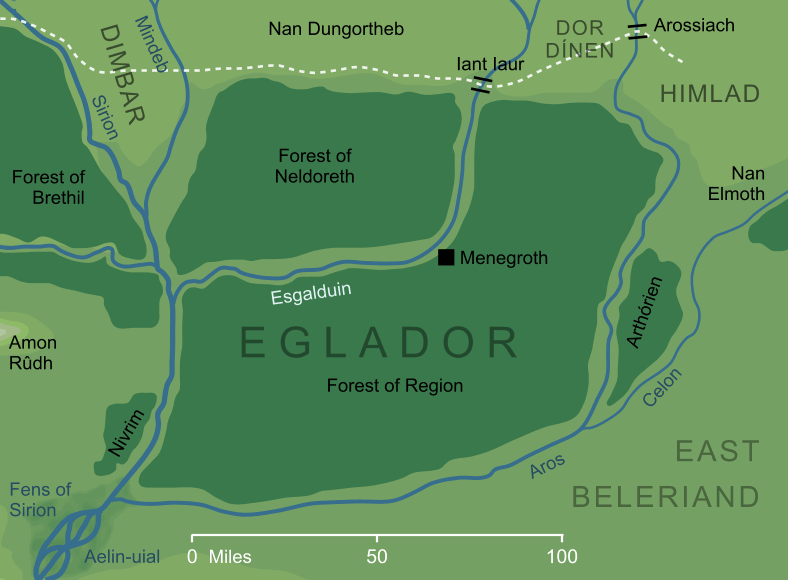- Cities and buildings
- Fields, plains and deserts
- Forests
- Hills and mountains
- Islands and promontories
- Lands, realms and regions
- Rivers and lakes
- Seas and oceans


 |
||||
|


Which personality type are you?
Take the Free mydiscprofile Personality Test to discover your core personality and your ideal job.   Which personality type are you? |
|
Dates
Founded about 3,335 years before the first rising of the Sun; renamed Doriath about 3,306 years later (29 years before the rising of the Sun)1
Location
Origins
Race
Division
Culture
Settlements
Pronunciation
e'gladorr (where 'rr' emphasises that the final r sound should be distinctly pronounced)
Meaning
'Land of the Eglath (Forsaken People)'
Indexes: About this entry:
|
EgladorAn old name for the kingdom of Doriath
The Teleri were the last of the three hosts of the Elves to complete the Great Journey. As they reached the western coasts of Beleriand, the clans of the Vanyar and the Noldor had already been taken across the Great Sea by the Vala Ulmo. As the Teleri waited for Ulmo to return with the Isle that he had used to carry them across the Sea, the Elves gradually spread across the lands of Beleriand. At last Ulmo returned, but while the Teleri had waited in Beleriand, their lord, Elwë, had vanished. His people sought for him across the land, and would not depart across the Great Sea until he had been found. Eventually a time came when Ulmo would wait no longer, and he drew away the island once again. Elwë's brother Olwë was carried into the West with many of his people, but the searchers were left behind. Having lost their chance to travel to Aman, these abandoned Teleri took the name Eglath, the Forsaken People. These Sindar, as they became known, dwelt far and wide across Beleriand, so that the whole region was known as Eglador, the land of the Forsaken. At last Elwë was found. He had wandered into the woods of Nan Elmoth, where he had come upon Melian the Maia, and became so entranced by her that years had passed before the two emerged once again. Together they founded a realm within the deep forests in the central parts of Beleriand, and this became the heart of the wider realm of Eglador. A Brief History of EgladorAll of these events took place during the first age of the Captivity of Melkor, more than three thousand years before the Sun and Moon would rise into the sky. The Two Trees were still shining in the West, but the only light in Middle-earth was starlight. During this time all the Elves of Beleriand acknowledged the power of Elwë (better known by his later name Thingol) and Melian. As the first age of Melkor's Captivity came to its end, a child was born to the king and queen of Eglador, whom they named Lúthien. Some centuries later, companies of Dwarves from the East began to settle in the Blue Mountains. Advised by Melian that the peace his realm enjoyed would eventually come to an end, Thingol conceived that he would construct a stronghold within his starlit forests. He called on the craftsmen of the Dwarves into his service to achieve this. Beneath the cliffs beside the river Esgalduin the Dwarves carved a great underground dwelling, known as Menegroth, the Thousand Caves. Menegroth was completed near the beginning of the third age of Melkor's Captivity, but even with Melkor held captive in distant Aman, dark things began to awaken and multiply in the world. Aided once again by the Dwarves, Thingol armed his people and sent them to drive off the new threat, and once again Eglador had peace for a time. Eglador Becomes DoriathUnknown to the people of Eglador, far away beyond the Great Sea the Valar chose to release Melkor from his imprisonment. After a time, he turned on his former captors, wreaking destruction in Valinor and fleeing to Middle-earth. He established himself in the fortress of Angband, far to the north of Eglador, and from this stronghold the Dark Lord released hordes of Orcs to ravage Beleriand. After millennia free from warfare, the Elves of Eglador found themselves embroiled in a desperate defence of their lands, though Thingol's earlier arming of his people meant that they were not caught wholly unprepared. The time that followed was later known as the First Battle of the Wars of Beleriand. Eastward of Eglador, the Elves fought back the Orcs and drove them back into the North, but on the plains westward, the Orcs could not be stopped, and roamed at will. In that region, only the walled shoreland cities of Brithombar and Eglarest stood against the tide of invaders. With the heartland of the realm under deadly threat, Melian the Maia used her power to raise a barrier around the central forests of Beleriand. This was the Girdle of Melian, a web of enchantment that prevented any from entering the land except by the will of Thingol or Melian. With the Girdle in place, Thingol's forest realm acquired a new name, Doriath, the 'land of the fence', and so it was known throughout the rest of its history. Soon afterward, the Noldor came out of the West in pursuit of Morgoth, and the rampaging Orcs were defeated. So the Sindar of old Eglador were saved, and continued to live in safety behind the Girdle of Melian for another five centuries. The histories of those later centuries no longer use the name Eglador, however, and during this time the later name of Doriath is always used. Notes
See also...Elu Thingol, Forsaken Elves, Land of the Girdle, Queen of Doriath, Ruin of Doriath Indexes: About this entry:
For acknowledgements and references, see the Disclaimer & Bibliography page. Original content © copyright Mark Fisher 1998, 2001, 2010, 2013, 2022. All rights reserved. For conditions of reuse, see the Site FAQ. Website services kindly sponsored by myDISCprofile, the free online personality test.How do your personal strengths fit in with career matching? How can you identify them? Try a free personality test from myDISCprofile. |